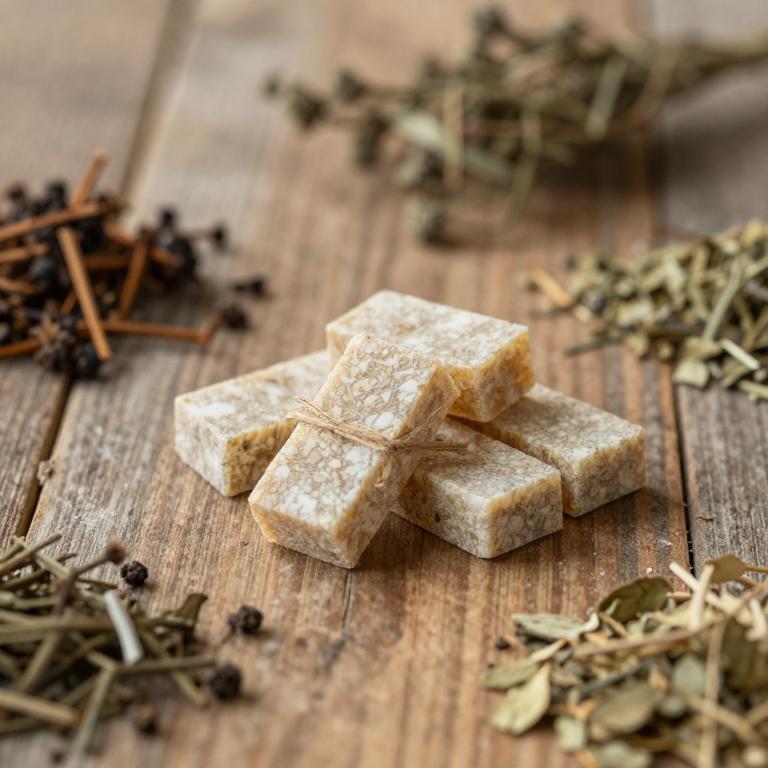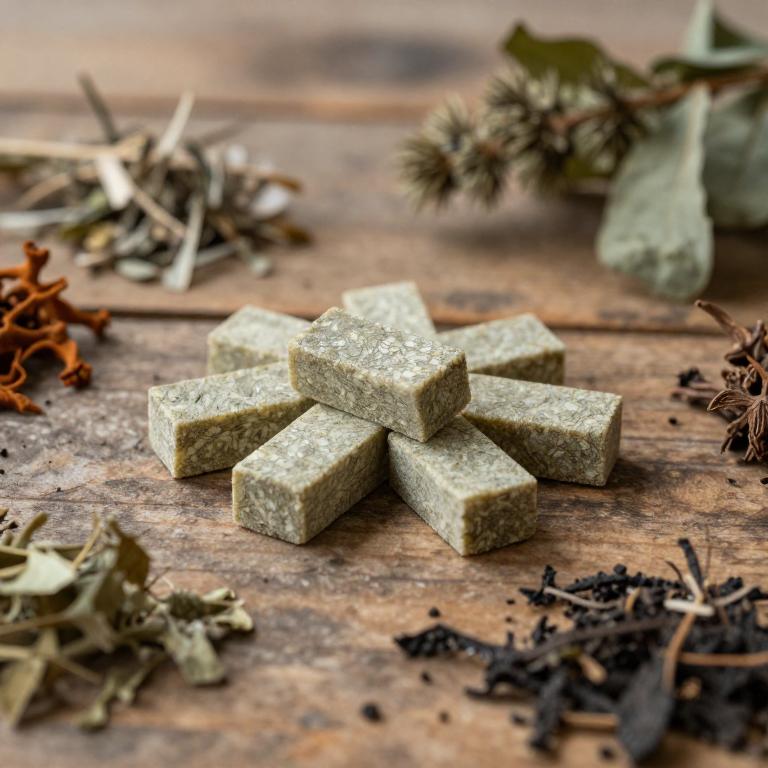10 Best Herbal Lozenges For Painful Swallowing

Herbal lozenges are a popular natural remedy for painful swallowing, often used to soothe sore throats and reduce inflammation in the throat lining.
These lozenges typically contain a blend of soothing herbs such as licorice root, chamomile, and eucalyptus, which have anti-inflammatory and antimicrobial properties. They work by creating a protective barrier over the throat and providing a cooling or warming sensation that can alleviate discomfort. Unlike conventional medicated lozenges, herbal options are generally free from synthetic ingredients and may be preferred by those seeking alternative or complementary therapies.
However, individuals with allergies or specific health conditions should consult a healthcare provider before using herbal lozenges.
Table of Contents
- 1. Licorice (Glycyrrhiza glabra)
- 2. Ginger (Zingiber officinale)
- 3. Salvia (Salvia officinalis)
- 4. Fennel (Foeniculum vulgare)
- 5. Peppermint (Mentha piperita)
- 6. Black pepper (Piper nigrum)
- 7. Cumin (Cuminum cyminum)
- 8. Eucalyptus (Eucalyptus globulus)
- 9. Echinacea (Echinacea purpurea)
- 10. Ceylon cinnamon (Cinnamomum verum)
1. Licorice (Glycyrrhiza glabra)

Glycyrrhiza glabra, commonly known as licorice root, is a traditional herbal remedy often used in the form of lozenges to alleviate painful swallowing.
These lozenges are prepared from the dried root of the plant and contain compounds such as glycyrrhizin, which have anti-inflammatory and soothing properties. The mucilage in licorice root helps to coat and protect the throat, reducing irritation and discomfort associated with conditions like sore throat or laryngitis. Glycyrrhiza glabra lozenges are widely used in herbal medicine for their ability to ease throat pain and promote healing.
However, long-term use may lead to side effects such as hypertension due to the effects of glycyrrhizin on sodium and potassium balance.
2. Ginger (Zingiber officinale)

Zingiber officinale, commonly known as ginger, has been traditionally used for its anti-inflammatory and analgesic properties, making it a popular ingredient in herbal lozenges for alleviating painful swallowing.
These lozenges work by soothing the throat and reducing irritation caused by inflammation or infection. The active compounds in ginger, such as gingerol and shogaol, help to reduce swelling and ease discomfort during swallowing. They are particularly beneficial for individuals experiencing sore throat symptoms due to conditions like pharyngitis or viral infections.
As a natural remedy, ginger lozenges offer a safe and effective alternative for those seeking relief without the use of pharmaceutical medications.
3. Salvia (Salvia officinalis)

Salvia officinalis, commonly known as sage, has been traditionally used for its soothing and anti-inflammatory properties, making it a popular ingredient in herbal lozenges for painful swallowing.
These lozenges are formulated to provide a calming effect on the throat, helping to reduce irritation and discomfort associated with conditions like sore throat or laryngitis. The active compounds in sage, such as flavonoids and essential oils, may help alleviate inflammation and promote healing of the mucous membranes. They are often preferred by individuals seeking natural remedies for throat pain, offering a gentle and effective alternative to conventional medications.
Regular use of sage lozenges can provide relief and support the body’s natural recovery process from throat-related discomfort.
4. Fennel (Foeniculum vulgare)

Foeniculum vulgare, commonly known as fennel, has been traditionally used in herbal medicine for its soothing properties, particularly in alleviating symptoms of painful swallowing.
Fennel herbal lozenges are formulated to provide a gentle, natural remedy that can help reduce inflammation and irritation in the throat. These lozenges often contain essential oils derived from the seeds of the fennel plant, which have antimicrobial and antispasmodic effects. The aromatic compounds in fennel can help ease discomfort by promoting a sense of relief and reducing throat irritation.
When used as part of a holistic approach, fennel lozenges may support overall throat health and provide comfort for individuals experiencing painful swallowing due to conditions like sore throat or laryngitis.
5. Peppermint (Mentha piperita)

Mentha piperita, commonly known as peppermint, is a popular herb used in the formulation of lozenges to alleviate symptoms of painful swallowing.
These lozenges work by delivering a cooling and soothing effect to the throat, which can help reduce inflammation and irritation. The active compounds in peppermint, such as menthol, act as a mild anesthetic and antispasmodic, providing temporary relief from soreness and discomfort. They are often recommended for individuals suffering from sore throats, coughs, or postnasal drip.
However, it is important to consult a healthcare professional before using these lozenges, especially for children or those with certain medical conditions.
6. Black pepper (Piper nigrum)

Piper nigrum, commonly known as black pepper, is a traditional herbal remedy that has been used for centuries to alleviate various ailments, including painful swallowing.
The active component, piperine, is believed to possess anti-inflammatory and analgesic properties that may help reduce throat irritation and discomfort. Piper nigrum herbal lozenges are formulated to provide a soothing effect by coating the throat and reducing the sensation of pain during swallowing. These lozenges are often made with natural ingredients, making them a safe and alternative option for those seeking relief from sore throat symptoms.
Regular use of piper nigrum lozenges may support faster recovery and improve overall throat health.
7. Cumin (Cuminum cyminum)

Cuminum cyminum, commonly known as cumin, is a spice with a long history of use in traditional medicine for its soothing and anti-inflammatory properties.
Cuminum cyminum herbal lozenges are formulated to provide relief from painful swallowing by leveraging the natural compounds found in cumin seeds, such as cuminaldehyde and thymol. These lozenges work by reducing throat irritation and inflammation, making them a natural alternative for individuals suffering from sore throats or painful swallowing. The aromatic and warming properties of cumin also help to ease discomfort and promote a sense of relief.
Due to their mild and pleasant flavor, these lozenges are suitable for regular use and can be a valuable addition to a holistic approach to managing throat discomfort.
8. Eucalyptus (Eucalyptus globulus)

Eucalyptus globulus herbal lozenges are formulated with the essential oil of eucalyptus, a plant known for its soothing and anti-inflammatory properties.
These lozenges are designed to provide relief from painful swallowing by reducing throat irritation and inflammation. The active ingredient, eucalyptus oil, helps to loosen mucus and ease the sensation of a sore throat. They are often recommended for individuals suffering from minor throat infections or dryness.
Regular use of these lozenges can offer a natural, non-medicated alternative to conventional throat pain relief options.
9. Echinacea (Echinacea purpurea)

Echinacea purpurea herbal lozenges are commonly used to alleviate symptoms of painful swallowing, often associated with sore throats or minor throat infections.
These lozenges contain extracts from the purple coneflower, a plant known for its immune-boosting properties. The active compounds in echinacea may help reduce inflammation and soothe irritation in the throat, making swallowing more comfortable. They are typically made with natural ingredients and are suitable for adults and children, though dosage may vary.
While they are generally considered safe, individuals with allergies to plants in the daisy family should exercise caution before use.
10. Ceylon cinnamon (Cinnamomum verum)

Cinnamomum verum, also known as true cinnamon, is commonly used in herbal lozenges to alleviate symptoms of painful swallowing.
These lozenges work by soothing the throat with their warming and anti-inflammatory properties, which help reduce irritation and discomfort. The essential oils in cinnamon have antimicrobial effects that may help combat infections contributing to throat pain. When dissolved in the mouth, the lozenges provide a slow release of active compounds, offering prolonged relief.
While generally safe, individuals with allergies to cinnamon or sensitivities should use them with caution.